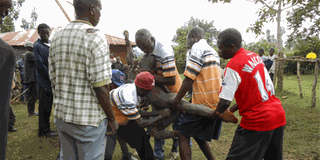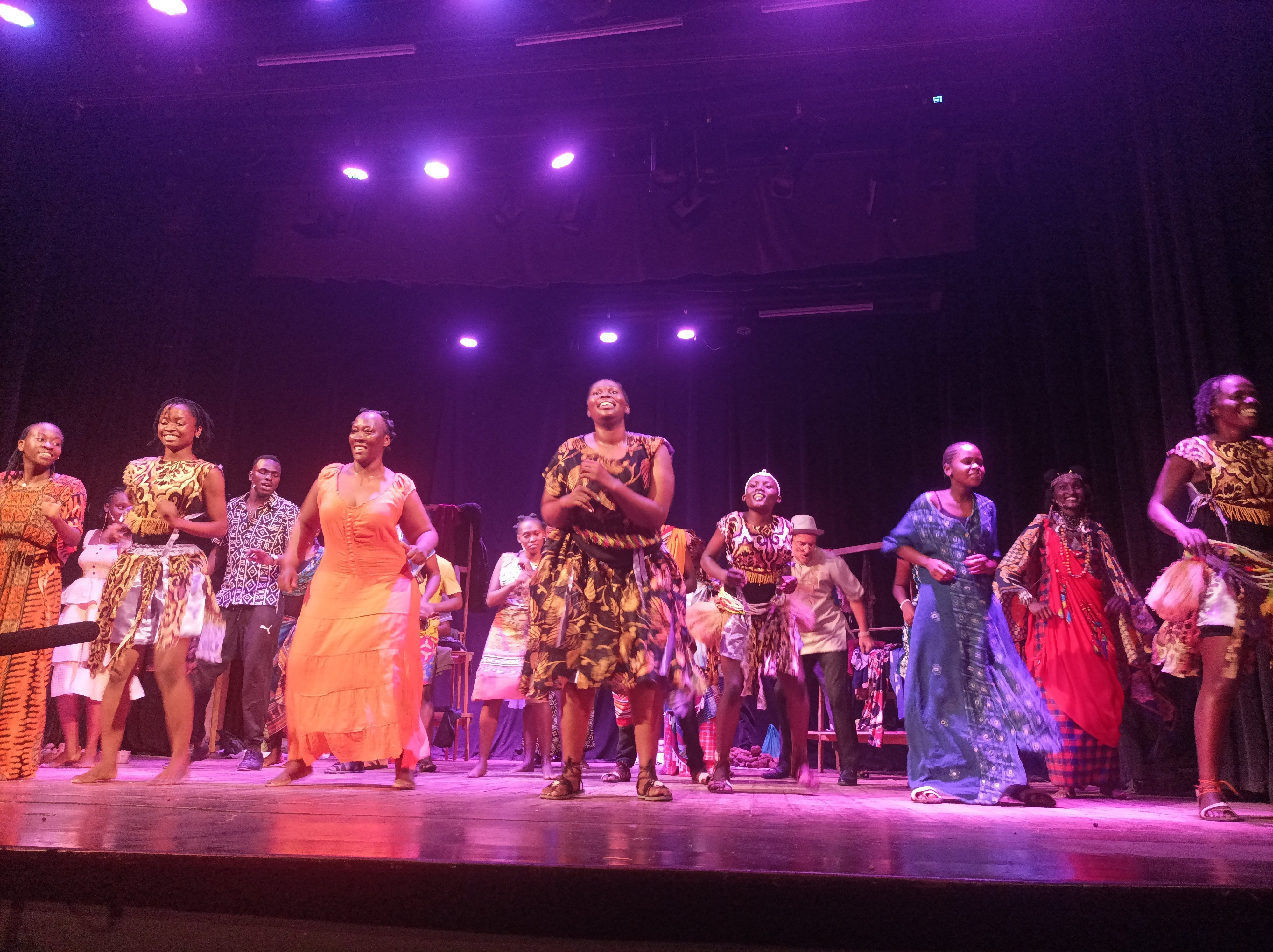What it means to... ... be circumcised traditionally

Sulaiman Wamimbi, 16, at his home in Mooni. He was among the boys who went through the Gishu circumcision ritual known as imbalu, this year. Photo by David Mafabi.
What you need to know:
Although the tradition of circumcision (imbalu) has come a long way, it is still mysterious, to some, how a Mumasaba boy decides to face this crude knife. One of the boys, Sulaiman Wamimbi, 16, now a man according to the Bamasaaba tradition, shares his experience.
I woke up on the morning of January 1, ready for celebration of the new year, only to hear the sound of horns blowing, then whistles, after which there was drumming of kadodi (Gishu local drums), announcing the arrival of imbalu season.
Although I got up with excitement to celebrate, by eating meat and a lot of food as it is done in our home, the blowing of horns changed the day.
My Father, Mr Rogers Musoni, called me inside the house and I sat before my elder brothers and then he asked me, “Have you heard the sound of the drums, sound of the horns and whitles announcing the arrival of imbalu? The time has come, are you going to get circumcised?”
An eerie sensation went through me, as I battled to get an answer to the question. I wondered whether I would be able to stand it. Even when I tried to dispel the idea that circumcision was not painful, some element of fear lingered within me.
I felt conflicted, with one voice in my head telling me to announce my decision while the other told me not to.
All my friends and age mates announced their intentions to face the 2012 imbalu, I pondered on it and called my father aside, and told him my decision, like it is required in our culture.
My father later told my brothers, and then the clan elders, who met with me to ascertain my seriousness.
After getting the go ahead, I received counsel from elderly male relatives about the challenges of the knife, adulthood, and what imbalu means to the Bamasaba tribe.
The elders asked me whether I was going to withstand the knife, or not, more than 10 times, and when they discovered I was serious, they accepted, performed some rituals and endorsed me for imbalu.
Preparations
As a requirement, I sought the consent of my maternal uncles by visiting them in the company of my mother before circumcision. It is with their consent that I began a three-day preparation for imbalu at their traditional courtyard in Mutoto, with some rituals.
I got up early on July 1, and I was handed a small traditional pot to go and fetch water for brewing our local potent gin—malwa, made from either maize or millet flour. And in the evening, my body was smeared with yeast and malwa, as it was for the other candidates. This went on daily as we danced to the tune of kadodi and imbalu songs, from relative to relative, alerting them about our intentions.
I danced for two days, accompanied by relatives, friends and neighbours wielding pangas, clubs and big sticks, just to stop me from cowering. On the third day, I visited my maternal uncles, again, for the last word and send off. During the visit, obscenities that turned hysterical, were shouted and then there was more dancing around me.
Although the desire to be circumcised is believed to be spiritually inspired—where the boys are allegedly influenced by the ancestral spirit of imbalu—I did not, at all, feel inspired. But because I had announced and been counselled, I kept praying, silently, to get the courage to stand imbalu, a debt required of every Mugisu (Mumasaaba).
A village kadodi dancing group moved around me as I looked curiously at the people wielding clubs. Fear could have gripped me but the imbalu-spiritually-charged crowd with women dancing half nude scared me more.
I bent further down and concentrated on dancing to the kadodi tunes, just to gather courage before getting to the courtyard for circumcision—imbalu.
At the cultural grounds the elders led me in song and dancing, before leading me to itoyi, a place where rituals are performed. Everyone joined in, I was smeared with mud (Lidoyi) claimed to be blessed by the spirits, and then I was led out.
A few minutes later, I emerged from the crowd moving briskly, not even bothering to look back as the crowd followed dancing and shouting,
“Ehhe... ehhe hhee…Sheta umwana afane Baba Wwe, eh eh eh eh eh….. Hheeee….hheee sheta Umwana afane Baba Wwe... Hhee,” loosely meaning circumcise the child to look like his father.
Within a moment, I was at the clan imbalu courtyard, standing still on a sisal sack covered with some sand and a stone. Two surgeons, led by Haji Yusuf Wamboga, were already at me. One pulled the foreskin of the penis before the other eventually cut it as the crowd kept shouting;
“Akyili, Akyili, Akyili………… tsililili, tsililili, awoo… awoo…, nde nde nde nde nde,” just to give me courage to continue standing firm.
True, I felt a lot of pain but as required traditionally, to dispel myths that circumcision is painful in bid not to scare the would be candidates, I told my brothers that it is simple and not as painful as people think.
I felt something hot, then some noise in my ears like “Kwaaap” then, eventually, I felt pain go through my nerves. But, of course, I had to keep the covenant I had made with my parents, uncles and other relatives not to shame them. I felt some bit of pain during the removal of the top most skin, although I did not notice this immediately, but when the surgeon began cutting the inside skin, there was great pain… the pain a weak person would not have withstood. I kept telling myself that if such pain continued, I would just give up and yell.
The surgeon then blew the whistle and I jumped up and down to signify that the process is complete. This was followed by ululations, dancing kadodi and I received gifts for withstanding the knife.
The surgeon disappeared into the crowd, at a breakneck speed, just to catch up with the next candidate supposed to be circumcised in the next village, as the elders around declared me a man who, only a few minutes before, had been his mother’s child, a boy.
I was given a chair to sit down but I remembered something my uncles had told me, “Never look at the surgeon because it is abominable the day you get circumcised.” I closed my eyes shortly just not to look at him. Many people told me that most of the costumes and instruments used in imbalu rituals are made from “fierce” wild animals, in order to depict the “fierce” nature of Bagisu men. But as they removed these costumes, I did not feel this fierceness.
As a newly circumcised man, the surgeon said, I am expected to get married and welcome other clansmen into my household and that therefore I needed land to carry out farming as well as build a house.
“But since you are at school, be a good boy, respect your parents and stay in school to attain education. You are now a man; you can go ahead and marry,” he said, then he drank some malwa and spread it on my hands before handing me a knife, piece of charcoal, a hoe, an axe and a panga.
As told to David Mafabi
Send your experiences to [email protected]




